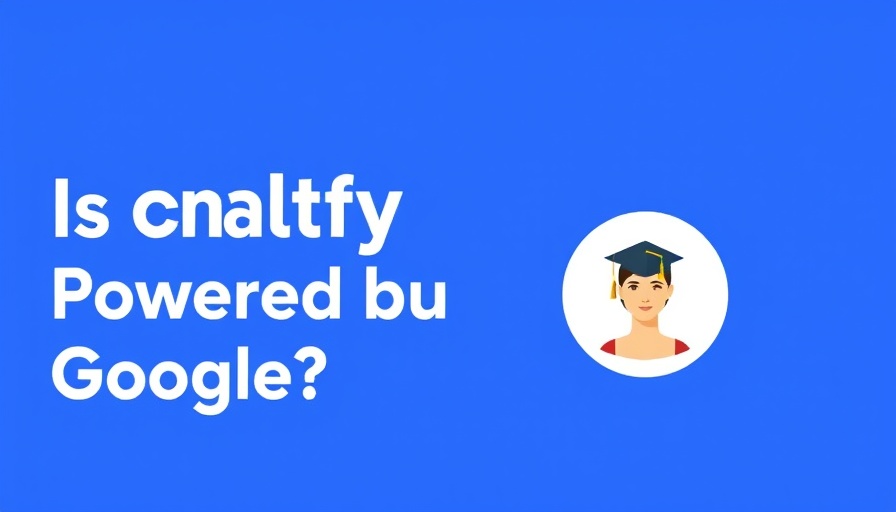
Is ChatGPT Really Powered by Google? The Findings You Need to Know
In the rapidly evolving landscape of artificial intelligence, the speculation surrounding ChatGPT’s data sourcing has sparked significant interest among small and medium-sized business owners. Given OpenAI's close affiliations with Microsoft, it was commonly believed that ChatGPT predominantly relied on Bing for its information intake. However, recent analyses suggest a much more complex reality—one that could impact how businesses engage with this powerful technology.
The Data Behind the Speculation: An Analytical Approach
A recent exploration into the search queries utilized by ChatGPT offers a fascinating glimpse into its operational methodology. Data scientist Xibeijia Guan of Ahrefs gathered the actual search queries, dubbed "fan-out queries," made by ChatGPT, alongside the URLs returned by these queries. By comparing these against Google's search results, the findings indicated distinct patterns that challenge preconceived notions of ChatGPT's dependence on Google.
On average, ChatGPT generates 1.78 search queries per prompt with a significant percentage providing just two queries. However, the overlap with Google results perplexes just about everyone. The analyses revealed that only 6.82% of ChatGPT’s search results featured in the top 10 Google SERPs, a stark contrast to expectations—suggesting that Google may not be the primary server of information for ChatGPT.
The Hybrid Approach: What Does It Mean for Businesses?
Interestingly, findings from further analysis conducted by another colleague illustrate that merely 12% of the links cited by ChatGPT also appeared within Google’s top 10 results. This strongly implies that ChatGPT employs a hybrid system, integrating search results from various sources, including its own data index and potentially other search APIs.
This multi-source approach is beneficial for businesses seeking reliable and diverse data. Instead of relying solely on a single source, such as Google, ChatGPT appears to gather and re-rank information from multiple outlets, streamlining the process of providing contextual answers tailored to user queries. For small and medium-sized businesses, this signifies a wealth of opportunity to engage with more varied and potentially less saturated content.
Enhancing Decision-Making with AI-Driven Insights
Understanding ChatGPT's operational methods opens doors to more strategic decision-making for businesses. Since ChatGPT isn’t confined to Google’s framework, businesses can leverage the AI's ability to offer innovative and unique insights. For instance, you can utilize ChatGPT to enhance your content marketing strategies—whether that involves generating engaging blog articles or optimizing your online presence across various platforms.
Additionally, companies can explore how ChatGPT’s diverse sources can aid in reputation marketing. By tapping into a wider array of data, businesses can better manage their online identities and foster connections that resonate with their target audiences.
Future Predictions: The Impact of AI in Marketing
As AI continues to evolve, the future landscape of marketing appears both exciting and complex. The prevalence of hybrid AI systems like ChatGPT may revolutionize the way businesses develop marketing strategies. Predictive analytics and agile decision-making could become the new norms, prompting companies to adapt quickly to changing consumer behaviors and preferences.
Moreover, as small and medium-sized businesses increasingly harness AI technologies, there’s potential for a more level playing field within competitive markets. With insights drawn from various data sources, even smaller enterprises can hold their own against larger, more established firms.
Final Thoughts: Embrace the Changing Narrative
If there’s one takeaway from the analysis of ChatGPT's data sourcing, it’s that assumptions can often lead us astray. OpenAI’s strategic moves suggest a concerted effort to lower its reliance on a single search engine, pushing boundaries to deliver tailored responses. This shift opens ample opportunities for small and medium-sized businesses to capitalize on AI technologies that prioritize adaptability, context, and personalized engagement.
In conclusion, understanding the multi-source integration of platforms like ChatGPT can leave businesses better equipped to navigate the challenges of digital marketing. As these technologies further develop, staying informed will be paramount in thriving amidst the rapid changes and innovations of the digital age.
Call to Action: Keep an eye on your marketing strategies and AI developments—start incorporating AI into your performance strategy today to stay ahead in the game.
 Add Row
Add Row  Add
Add 



Write A Comment